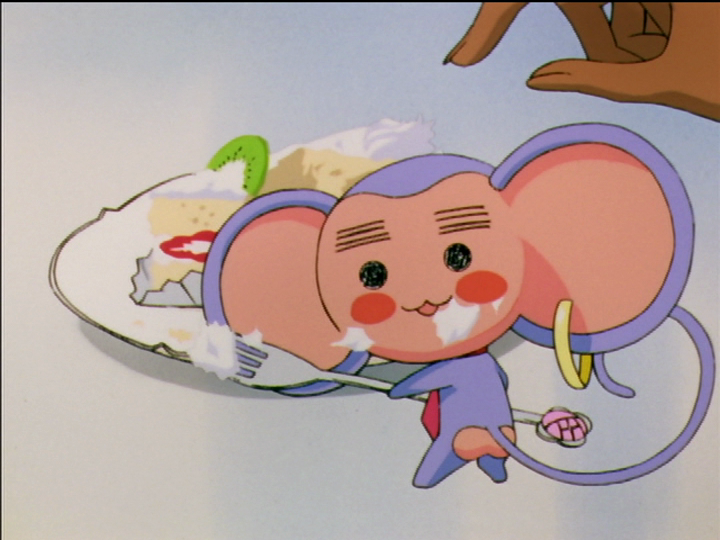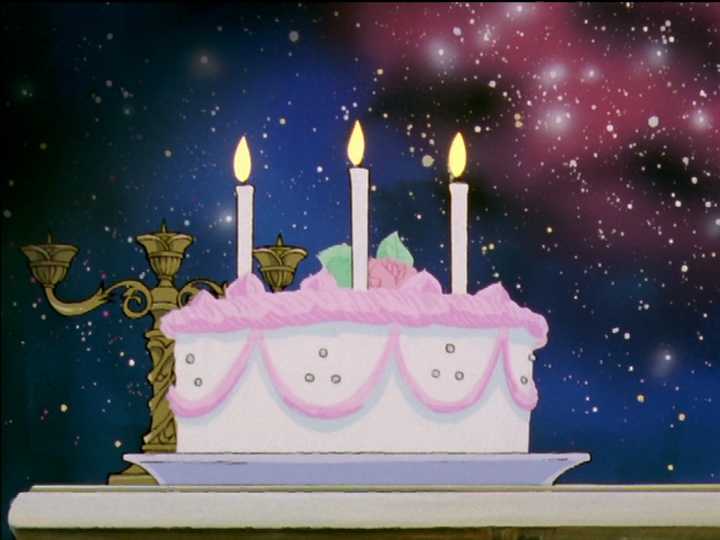Utena - cake catalog
What are cakes about? Here are the cakes in Utena.
It’s four incidental cakes and one cake that is essential in the story. The cakes with strawberries (in the gray box) seem to emphasize minor points and are all for Chu-Chu. Touga’s birthday cake is an organic part of his story, and aligns with the seeming birthday cake of episode 30. The cake of episode 30 is critical for interpreting the episode, which is critical for the series as a whole.
Food is associated with sex—at least, Utena associates them. And every one of the cakes represents a falsehood. In Utena, male sex is about power and control, enforced in part by lying, as in Akio’s illusions. Love and lying go together like cake and icing. And yet it seems to me that cake means love rather than sex.
If cake is love, then eating cake should be tasting sweet love—or more strictly, seeking to taste sweet love. The only character we see eating cake is Chu-Chu. Anthy is not allowed to taste sweet love, so her thwarted desires are displaced onto Chu-Chu; that’s how I read it. Chu-Chu eats everything, but eagerly seeks out cake (see Chu-Chu’s delighted expression in episode 14 when Utena brings a cake home). Of course cake is also falsehood; Chu-Chu has an eating disorder, disguised as an “overeating is funny” anime trope. The eating disorder is not only a symbol of thwarted desires, it is a realistic depiction of how someone in Anthy’s stressful position may react. In contrast, Utena does not want cake: She does not seek sweet love until Akio tempts her with the cake of episode 30.
All the cakes are round (and therefore female) and frosted white for the prince. All girls are to seek their princes and find sweet love. The strawberry cakes are for Anthy’s lost love of Dios and/or upcoming love of Utena. Touga’s cake is for the would-be prince Touga. The cake Akio made is trimmed with pink for Utena, and stands for Akio capturing her love—Akio seeks to become Utena’s prince.
These three cakes have strawberries. It’s an anime trope; strawberries are girlish and are associated with cuteness and innocent love. The three are all for Chu-Chu, and therefore refer to Anthy. All three come with false implications—meaning that the cuteness and innocence are false too. Anthy’s love is anything but innocent. They are subversive cakes. Utena does not want cake herself, but lets Chu-Chu eat the cakes. Utena’s own love may be innocent, but she doesn’t know it exists.
This cake is unexplained. It just shows up. Chu-Chu jumps into it, and no doubt eats the whole thing. It seems to support Utena’s claim that she won the duel for Chu-Chu’s sake, not Anthy’s. Chu-Chu gratefully gives Utena the strawberry, which can be taken as calling her cute. Utena’s claim is bogus, though. She closes her eyes when she says it, unwilling to see her falsehood, and immediately before had heavy iris outlines. Nevertheless, given Chu-Chu’s meaning (see Chu-Chu’s arc), it is symbolically true. Utena holds off Chu-Chu with a finger, like Utena going with Akio in the Apocalypse Saga, then lets go. Utena’s actions end up freeing Anthy’s suppressed desires, which Chu-Chu embodies, and allowing her sweet love. Compare Chu-Chu’s heart-shaped cookie, which predicts sweet love to come.
How people treat Chu-Chu is how they treat Anthy, so Utena’s claim is not far off anyway.
Utena brings this cake into the dorm as a leftover from a class party. She strangely places it on the windowsill rather than the table, and Chu-Chu knocks it outside. It seems to imply that Anthy is in trouble for having to explain her absences on Saturday nights, the same way Chu-Chu is in trouble, hanging on to the outside of the windowsill. It’s bogus again, though. It’s part of Akio’s plan to meet Utena in person. Chu-Chu nearly falls when Akio is mentioned—that seems to be an honest reaction.
Utena presumably brought the cake for Chu-Chu. She must know Chu-Chu well enough to realize it will all go to Chu-Chu. What does it mean that Utena places the cake on the windowsill? This is the episode that introduces Akio. I think the falling cake represents Anthy’s sweet love lost, as in the origin myth when Dios became Akio. Like the cake above, it foretells information we don’t have yet. Anthy nearly loses her love of Utena in the Apocalypse Saga, and recovers it only when she leaves the Academy. And Anthy’s psychological defense, Chu-Chu, nearly falls.
Chu-Chu is eating cake. I guess it’s something to do. There’s a bit of byplay with Tatsuya hitting on Chu-Chu and Chu-Chu responding, which is of course bogus. It presumably means that Tatsuya finds Anthy attractive, as many others do. It does make Wakaba’s point about Tatsuya.
This cake should be a prediction too, but if so I don’t see it. I take the green to be a slice of kiwi fruit. It says that control is a theme of the cake (compare the green bits on the episode 30 cake below).
We do not see anyone eating the remaining two cakes, though we can be pretty sure they end up eaten. They represent false love, so the characters do not truly taste sweet love.
Touga’s birthday cake, from the flashback when little Nanami gives him the kitten.
All other cakes represent falsehoods. The cakes with strawberries have false implications, and the cake below is a false birthday cake. All other cakes represent love in some stage of its development. But apparently there is no love in the Kiryuu household. According to a parallel with The Rose of Versailles, one purpose of the candles in the Kiryuu mansion is to turn it into the corrupt Palace of Versailles, where love is for show. This cake represents false love. Its falsehood is that it lies about its own meaning.
The cake has 12 candles, in a ring like the numbers on a clock. The candles count years and are a kind of timekeeping device, and their arrangement makes the cake into a clock. The birthday party shows Touga’s adoptive family grooming him to become the family patriarch, and I think the ring represents that he is captured by the prospect. A patriarch is a kind of prince, with power, and he loves the idea—he loves Akio. It’s much like Utena’s ring; he wants to be a prince and to marry his prince Akio.
For the meaning of the flowers around the cake, see flowers - Touga’s birthday cake.
Akio bakes this fancy cake to impress Utena. The three candles are necessary so that we can interpret it as a birthday cake and understand the episode, but the candles are metaphorical and unreal and it’s not a birthday cake. The group of Akio, Anthy, Utena and Wakaba eat the cake at the start of the episode, but we don’t see them eating: The cake in itself is not important. Well, it demonstrates Akio’s lie-by-implication that he cares about Utena, and by contrast with the strawberry cakes it symbolizes Utena realizing her desire for Akio (and it refers to Wakaba’s feelings about Akio too). It’s the first cake that Utena wants to eat (she complains about Wakaba arriving, already jealous). Until now, she did not seek to taste sweet love.
The main purpose of the cake is to establish the metaphor behind the episode that blowing out the candles means making a wish. The cake disappears after the beginning of the episode (for the falseness of Akio’s love), and the candles remain throughout (for Utena’s temptation).




